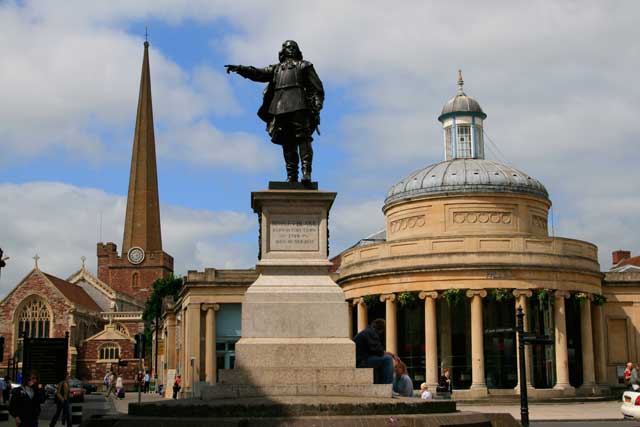Last Weekend: Bridgwater boy who helped Britannia rule

Rio and New Orleans may not quite quake in their fancy boots at the assertion by this Somerset market town that it is the "Home of Carnival". Nevertheless, I arrived last weekend for the first time to Bridgwater's tidy little station to find a touch of the exotic: not the model-railway shop on Platform 2, but the Pythonesque portraits on the opposite side of the tracks, part of a project called "Trains of Thought".
Exotic, too, are the destinations advertised as bus connections: Aller, spurring French visitors to go; the inspirational options of Pict's Hill, St Decuman's and Weston Zoyland; and Huish Episcopi, which presumably is either ecclesiastically significant, or a patented piece of medical equipment.
Last weekend, though, it was initially difficult to feel as enthused by the fact of being in Bridgwater as one might be in, say, Brazil's coastal metropolis or Louisiana's largest city. Goodness knows where all those charity shops get their stock, never mind customers. While nearby Glastonbury has the mystique of both a festival and converging ley lines, Bridgwater is merely where the A38 and A39 merge.
Old black-and-white prints on the walls of the Riverside Café testify to the days of plenty, when cargo ships crowded the quays of the River Parrett. The earnings from trade with the colonies paid for the handsome redbrick structures that still add gravitas to a town whose fortunes drifted out with the tide.
A sign outside the café pointed to the Blake Museum. What connection, I wondered, did the artist, visionary and poet who wrote Jerusalem have with this corner of Somerset?
None, as it turns out: William was the wrong bloke, and Blake. The statue that commands the centre of Bridgwater is of "Robert Blake, born in this town 1598, died at sea 1657" (a century before William was born).
The excellent Blake Museum, at the end of a stumpy cul-de-sac named Blake Street, occupies the house where he is thought to have been born to a local merchant at the end of the 16th century. After fighting heroically for Cromwell's New Model Army in the Civil War, Robert Blake was appointed General-at-Sea, effectively one of three commanders of the Royal Navy.
At the time, England was a puny maritime power, its strength further diminished by the chaos of the Civil War when Parliamentarians and Royalists operated competing fleets. Blake began his naval career hounding the Royalists out of Kinsale in Ireland and the Scilly Isles, then harried the Dutch, the Spanish and the Portuguese.
By the time he succumbed to his wounds on a voyage home to Plymouth, Britannia was doing a pretty good impression of ruling the waves – not least because he wrote the book on tactics and discipline, entitled The Laws of War and Ordinances of the Sea.
Despite his remarkable achievements, Robert Blake doesn't even merit an adjective in "Ye Mariners of Britain" by the Scots poet Thomas Campbell, whose faint praise refers to "Where Blake and mighty Nelson fell". But last weekend, they remembered him in Bridgwater.
Next weekend: the Orchard Garden (01278 684690; orchardgarden.co.uk), offering self-contained accommodation on an old estate three miles north of Bridgwater, still has availability.
The Blake Museum (01278 456127; blakemuseum.org.uk) opens 10am-4pm from Tuesday to Saturday, admission free.
Subscribe to Independent Premium to bookmark this article
Want to bookmark your favourite articles and stories to read or reference later? Start your Independent Premium subscription today.

Join our commenting forum
Join thought-provoking conversations, follow other Independent readers and see their replies